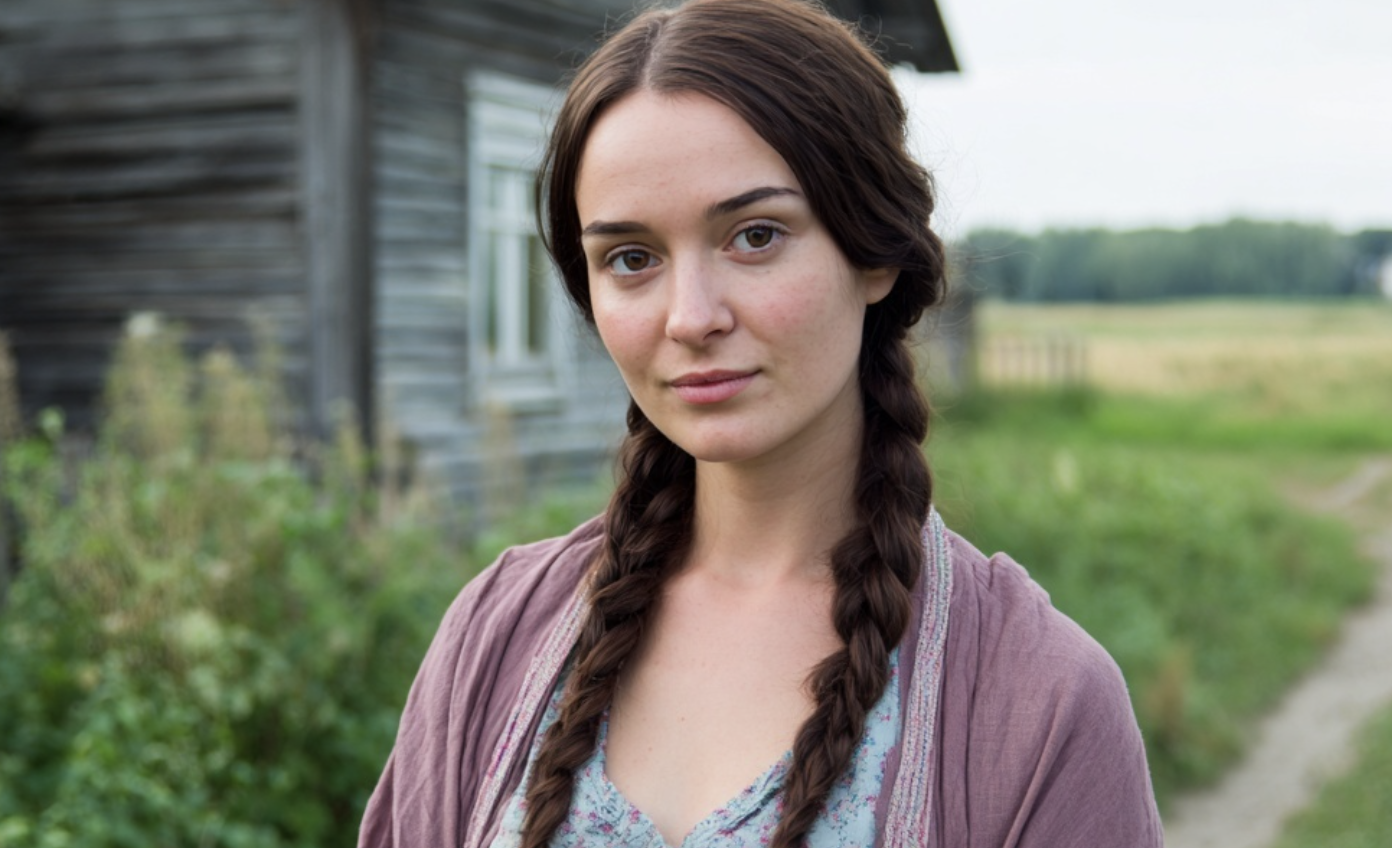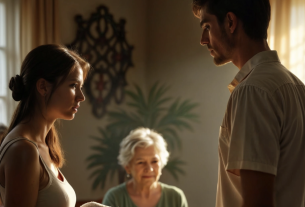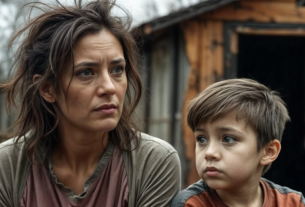The autumn air in the settlement of Lesnaya Sloboda was thick, sweet, and searingly cold. It smelled of rotting leaves, smoke from stove pipes, and that special, timeless silence that wraps the soul like a good old blanket. Olga had come here, to the nest she’d left long ago, to visit her parents—or rather, their silent marble witnesses on the hill by the church. To straighten the fence, touch up the little stars, and talk to the wind that seemed to keep the whisper of their voices.
She stayed with her cousin, Aunt Sveta, in the very same wooden house with carved window frames where her childhood had passed. Two plots over stood another just like it—the one that had belonged to her parents—long since sold. Aunt Sveta lived alone. The spacious front room held the echo of former merriment: faded photographs on the dresser, a heavy sideboard smelling of wax, and a rocking chair by the stove where Uncle Misha used to sit.
She had buried her husband, Uncle Misha, long ago—ten years or so. Her son, Artem, had gone north, to the land of permafrost and white nights, and had stayed there, soul bound to that stern country. Over evening tea with raspberry jam, Aunt Sveta, trying to be cheerful, couldn’t help letting slip a small, sparing complaint:
“Artemka doesn’t visit me often. And when he does, it’s mostly by himself. I went to them—no, I’m lying—twice. The first time for the wedding: white dress, scorching summer, mosquitoes. And then for his mother-in-law’s jubilee. And last year he brought his whole family—introduced me to my grandson, Yelisey. A one-year-old tot, rosy cheeks, eyes like his father’s, serious.”
She fell silent, looking at the flame of the kerosene lamp, and a warm, deep smile lit her face.
“As for the child, the way he came to them was downright amazing—like a fairy tale. Want to hear it? My daughter-in-law Veronika poured it all out to me when they were visiting. She’s gold, not a woman. My Artem got lucky.”
“Of course I do!” Olga brightened, moving closer. “Everything about my brother interests me. We practically grew up together, even though he’s five years older. We raced our bikes down this very street, splashed through these very puddles.”
“Well then, listen,” Aunt Sveta adjusted the shawl on her shoulders and began, her voice taking on a sing-song cadence, as if she were reading some old, dog-eared book.
“Veronika was born and raised in the North, a child of snows and blizzards. After school she didn’t want, like so many, to rush off to the big cities. She went to Blagoveshchensk, finished an economics institute there, and then—back home. A home-loving, quiet girl with deep roots. She got a job in the accounting office at an ore-processing plant. That’s where she met Artem.
“He had just been made a crew foreman, a real go-getter, still hot-blooded. He came to her office to sort out his guys’ pay slips—something didn’t add up. Veronika patiently explained it all to him: this column, this figure, this coefficient. And he stood there looking at her, seeing no columns and no figures at all. He saw big, clear eyes the color of the northern sea, dark hair braided into a tight plait, and serious lips that trembled ever so slightly. He stared so intently that the girl grew flustered and even angry.
‘Why are you staring at me like a painting in a museum?’ she burst out. ‘You’d better listen; I won’t be repeating this later.’
“Artem didn’t flinch. He smiled with that broad, disarming smile of his, the one that sent Veronika’s heart tumbling into her heels.
‘I’ve understood everything. Perfectly. Only one question remains. Are you married?’
“Veronika was taken aback. She was about to fire back something sharp when from behind Artem came the voice of the chief accountant, Aunt Lyuda, a seasoned woman who’d seen it all.
‘Not yet, not married!’ she bellowed across the office. ‘So don’t dawdle, boy—pictures like that don’t just pass you by!’
“Artem did not dawdle. That very day he waited for her by the factory gate, snow-covered and lit by orange lamps. From under his thick jacket he pulled a lone red rose that seemed to have absorbed all the warmth of his heart and not frozen in the minus-thirty cold. Veronika later confessed that her heart simply burst with tenderness. She accepted his rose. And that’s how their story began.
“For a year they tested their feelings: they walked through snow-laden parks, went to the movies, sat side by side in silence listening to a log crackle in the hearth. Then they simply went to the civil registry office. Veronika’s parents—young themselves—helped the newlyweds; they chipped in, the couple added their own, and they bought a nice two-room apartment. Artem took a small loan for renovations and furniture. They lived in perfect harmony. He carried his Vera in his arms, called her his Northern Princess, and she thawed like a spring river, giving him her tenderness and boundless devotion.
“But one sorrow shadowed their happiness. After long rounds of doctors and painful tests, the verdict was merciless: there would be no children. The problem was serious and unsolvable.
“Veronika sank into despair. She feared Artem would stop loving her, that his line—so strong and sturdy—would end with her. But one evening he hugged her, pulled her close, wiped her tears roughly away with his thumb and said, ‘Listen to me. You and I—we’re a whole universe. And universes can be very different. In some worlds it’s quiet and calm, and that quiet has its own beauty. We can be enough for each other. And if you want, later we’ll take a baby from the orphanage—the quietest, most unhappy one—and give him all our love.’
“But Veronika wasn’t ready for an adopted child. A naïve, childlike hope for a miracle still smoldered in her soul. She began to go often to a small wooden church on the edge of town. She stood on the cold stone floor, a candle trembling in her fingers, and whispered the same prayer over and over like a poem. At home she hung in the icon corner an image of the Mother of God ‘Softening of Evil Hearts,’ which an elderly candle-seller by the stand had advised her to buy. Each evening she lit a vigil lamp before it and prayed, entrusting her pain and hope to the silent, sorrowful eyes of the Mother of God.
“And then one especially cold evening, when the frost painted fanciful icy gardens on the glass, Veronika was coming home from work. The air rang with the freeze, the stars in the black sky looked like shards of ice. She had almost darted into the warm entryway when her ear caught the faintest sound—not a squeak, not a howl— a plaintive, broken whimper coming from under the stairwell, out of impenetrable darkness.
“Her heart clenched. She bent down and, in the dim beam spilling in from the street, she saw it. A tiny bundle, more like a dirty rag doll than anything else. A puppy. No way to tell the breed—a mix of everything on earth. He sat pressed against the cold concrete wall, trembling all over, and his eyes, huge and full of mute terror, looked up at her, begging for a miracle.
“Veronika didn’t hesitate for a second. She tore off her woolen scarf, carefully wrapped the freezing little body, pressed it to her chest, and ran up the stairs, her heart beating like a bird in a cage.
“Artem was home. Seeing her tear-streaked face and the bundle in her arms, he jumped up. ‘Vera, what happened?’ She unwrapped the scarf and the trembling bundle tumbled onto the kitchen floor.
‘I… I found him in the entry. He’s freezing. We can’t put him out, can we? Please?’ Her voice shook.
“Artem looked at the pathetic creature, then at his wife, at the tears shining in her eyes. He sighed, stepped closer, bent down, and scratched the pup behind the ear.
‘Well then, perfect,’ he said calmly. ‘There’s your child. Raise this little one. And the house will be merrier.’
“They named him Tim. And their life truly blossomed. That tender, big-eared little bundle with the spring-coil tail demanded attention, care, love. Veronika devoted all her free time to him: cooked porridge, took long walks, bought toys, took him to the vet. She put him to bed in a basket beside their bed and sang lullabies. Tim answered with boundless, ecstatic devotion. He became her shadow, her child.
“And six months later something strange began to happen to Veronika. In the mornings she was nauseous, dizzy, seized by odd weakness.
‘Vera,’ Artem said one morning, worried. ‘You’ve probably developed an allergy to fur. We’ll have to take Tim to your parents. Or I’ll ask at work who can take him. It’s a pity, of course, but health comes first.’
“Veronika nodded silently, gripping the edge of the table. Give Tim away? No—she couldn’t. It was beyond her strength.
“The next day Artem left for his shift. Veronika called in to work and asked for the day off, saying she was going to the doctor about the allergy. She spent the whole day at the clinic, giving tests and undergoing examinations.
“In the evening Artem came home, tired and dusted with snow. Tim, as usual, greeted him with joyous barking. As he was taking off his coat in the hall, Artem called to his wife:
‘Vera! It’s arranged! Our foreman, Viktor Ivanych, will take Tim! His boy is just the right age—keeps asking for a dog. We’ll give our oddball to good hands—he won’t come to harm…’ He walked into the room and fell silent.
“Veronika stood in the middle of the room. She wasn’t crying. She was radiant. Such a flood of happiness poured from her eyes that Artem felt physically warm.
‘We are not giving him to anyone,’ she said quietly but very clearly.
“Puzzled, Artem looked at her—and at that moment she couldn’t hold back; she flung her arms around his neck, sobbing with unbridled joy.
‘Artem… my love… God heard me. He heard us! We’re going to have a baby. Our own. The doctor told me today… I still can’t believe it!’
“They stood there, embracing, in the middle of their cozy kitchen, while at their feet the happy dog wagged his tail, not understanding what had happened but sensing that something incredibly good had come to pass.
“And in due time a boy was born. They named him Yelisey. Healthy, sturdy, with his father’s serious eyes.”
Aunt Sveta finished her tale. The front room was quiet, broken only by the crackle of wood in the stove. Olga couldn’t hold back her tears. They ran down her cheeks in warm, salty streams, and she didn’t even try to wipe them away.
“Yes, Aunt Sveta…” she whispered. “It truly is a miracle. I believe that’s how it happens. Sometimes angels send us a trial in the form of a defenseless creature. And if we pass it—if we don’t grow hard, don’t turn away—we receive a reward we couldn’t even imagine. Maybe it was Tim who prayed that baby into being for them? Or life itself saw how much of Veronika’s maternal love was still unspent and gave her a chance.”
“Who knows,” Aunt Sveta smiled, the flame of the lamp reflected in her eyes. “Who knows… The main thing is, now they’re all together. And Tim, by the way, is the chief nanny and guardian. He won’t let strangers near the pram or the crib. Starts to growl. That’s our boy—the puppy from under the stairs.”
Olga stepped out onto the porch. The night was clear and frosty, the bottomless sky strewn with myriads of stars. She gazed up at them and thought that miracles really do live alongside us. They hide in frozen entryways as shivering puppies, in the warm hands of loving people, in quiet but unshakable faith. And from these thoughts goosebumps ran across her skin, while her soul grew light and calm.



